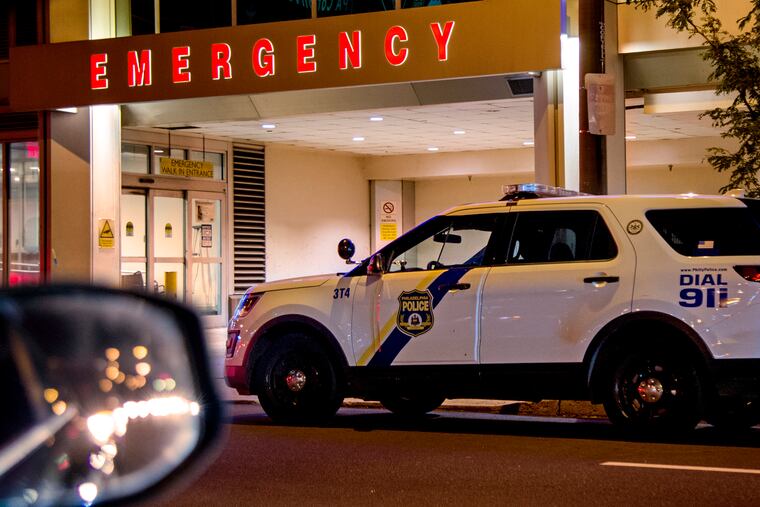Hahnemann University Hospital ER cuts services, citing staff shortage
A day after Pennsylvania officials ordered the owner of Hahnemann University Hospital not to take any steps toward closing the Center City facility, the hospital’s emergency department on Friday was not accepting patients with certain serious medical conditions.

A day after Pennsylvania officials ordered the owner of Hahnemann University Hospital not to take any steps toward closing the Center City facility, the hospital’s emergency department on Friday was not accepting patients with certain serious medical conditions.
“IMPORTANT! Effective immediately, Hahnemann University Hospital, 230 N Broad Street (Broad & Vine Sts.) can no longer accept Trauma, STEMIS [serious heart attack], stroke patients or patients with other critical medical conditions,” a Fire Department notice said.
Hahnemann said the notice was not entirely accurate, because the hospital was still accepting stroke patients through the emergency department. However, the hospital was unable to accept surgery or serious heart attack patients because eight of 12 scheduled operating room nurses did not show up for work, and the two cardio-thoracic surgeons on duty left early, at 1 p.m.
It’s not clear if what happened Friday will repeat.
“The [diversion] request was for today,” a city official said. “It may be a day-to-day decision."
The Pennsylvania Department of Health’s order Thursday said Hahnemann must stop “any action toward closing Hahnemann and/or eliminating services, particularly emergency department services,” until the department received the required 90-day closure notice and approved a closure plan. A large portion of the financially struggling hospital’s patients are poor and dependent on government insurance.
State and city regulators want Hahnemann to remain open, at least temporarily, but have little leverage to force it to continue operating if the owner, Philadelphia Academic Health System LLC, doesn’t have enough money, medical staff, and supplies to operate safely. Through legal action, they might be able to determine whether the dire financial picture painted by hospital officials is accurate, but that could be too late for patients.
Philadelphia Academic Health System was expected to file for bankruptcy protection Friday, according to a notice on the website of the Accreditation Council for Graduate Medical Education, which oversees medical schools’ sponsorship of residency and fellowship programs.
“The ACGME has been notified that the hospital will file for Chapter 11 bankruptcy on or about June 28, 2019, with the intention to wind down hospital operations and subsequently close Hahnemann,” the group wrote on its website.
But the filing had not happened by 5 p.m. Friday.
A bankruptcy filing by Philadelphia Academic Health System, which also owns St. Christopher’s Hospital for Children, has been expected in recent weeks as the company failed to get what it considered a satisfactory lifeline from state officials or reach a deal to sell Hahnemann before closing it.
The hospital announced Wednesday that it will shut its doors for good on or about Sept. 6 and told state regulators it would eliminate 2,572 jobs by Aug. 25.
Despite the state’s effort to keep the hospital open though the July Fourth holiday, a time of year when Philadelphia officials expect an higher-than-normal number of transports in Philadelphia, the number of patients is already declining as doctors hesitate to send patients there.
“You cannot admit a patient, no matter what the state or the law says, if you don’t have adequate supplies to take care of them," said Patricia Lyons, a nephrologist and internal medicine doctor who is part of a group independent physicians associated with Hahnemann.
The number of patients at the hospital had fallen to about 180 Friday morning from more than 200 the day before. Hahnemann attributed the census decline to the closure announcement, which was expected to prompt patients to stay away.
Joel Freedman, a California investment banker, bought Hahnemann and St. Chris from Tenet Healthcare Corp. early last year for $170 million. He said in April that the hospital was losing $3 million to $5 million a month and would have to close without help from the state and others.
Hahnemann is the primary teaching hospital for the Drexel University College of Medicine and employs about 575 residents. A federal program that helps pay for doctor training reimburses Hahnemann about $100,000 annually for each of them.
Separately, Philadelphia officials filed an emergency petition to intervene in Drexel University’s lawsuit, filed June 21 in Common Pleas Court, against Freedman and American Academic Health System LLC, the highest-level holding company for Freedman’s Philadelphia hospital operations.
Drexel sought a preliminary injunction that would at least temporarily keep Hahnemann open. The university said Freedman’s short-notice closure plans would violate an agreement under which Hahnemann services as the primary teaching hospital for more than 1,000 students in Drexel’s College of Medicine.
The city wants to block Freedman from ending or reducing emergency services before July 12, with particular concern for the city’s July Fourth celebration on the Parkway.
“Hahnemann, which is located only six blocks from 21st and the Benjamin Franklin Parkway, is by far the closest emergency care facility to the Parkway event,” the petition said. “There is significant risk that attendees of the Parkway event will suffer harm to their health and safety should defendants abruptly close Hahnemann’s emergency care facilities as presently planned.”
At a hearing Tuesday, Judge Nina Wright Padilla did not rule on the preliminary injunction, but ordered the two sides to try to work out an arrangement and come back Monday, which is also when the city is expected to make its case.